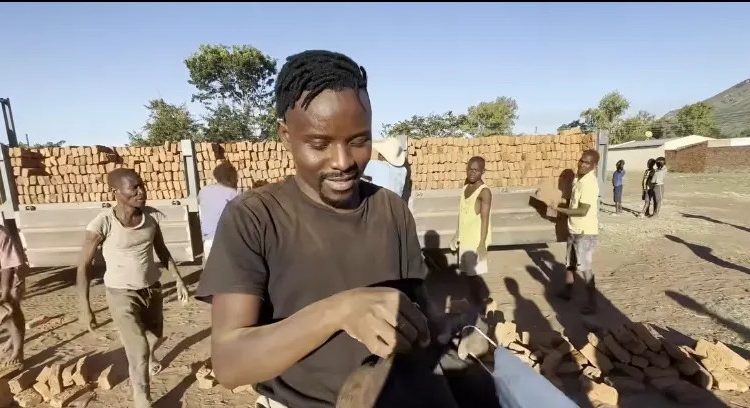“This is me, and this is my third day in Wakata.”
No production team scripted these opening lines. No director called “action.” This is Namadingo’s most raw performance—a 12-minute video diary filmed on a phone, posted from under a tree where signal barely whispers through.
The Venue: No Lights, No Stage, Pure Truth
Wakata Primary School is not a venue any artist would choose. Its “stage” features crumbling walls that threaten to become the final curtain for anyone beneath them. The “orchestra pit” holds 180 Standard 2 students crammed into a space meant for 50. The “balcony” is the outdoors, where another hundred children sit under trees, hoping rain doesn’t end today’s show.
Yet here stands Malawi’s most celebrated performer, having traded concert halls for classrooms where the acoustics carry not music, but fear.
“Don’t you fear these walls might fall?” he asks teachers and students.
Their response becomes the haunting refrain of this reality show: “Yes, we fear. But we have no option.”
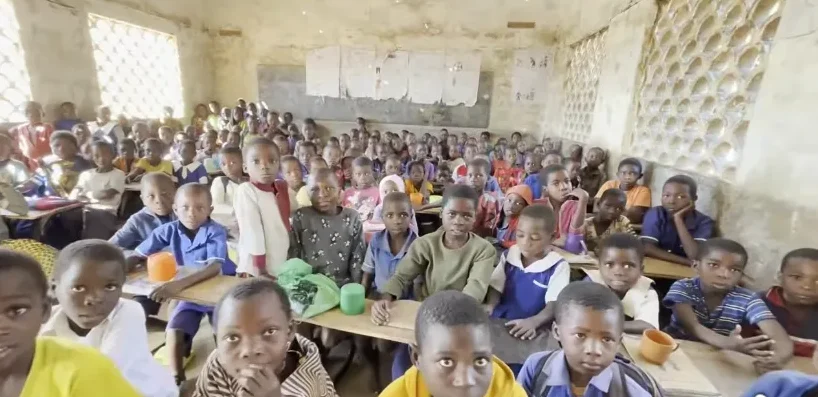
The Character Arc: From Star to Villager
In theater, the most compelling characters transform before our eyes. Namadingo’s metamorphosis from celebrity to “The White Shirt Village Boy” isn’t a costume change—it’s method acting at its most committed.
His dressing room: a simple space with purple curtains hastily hung, a thin mattress his only comfort.
His backstage routine: fetching bricks and sand at dawn, hands that strum guitars now gripping construction materials.
His green room: the shade of a specific tree at the trading center, the only place his phone can catch enough signal to share this unfolding drama with the world.
“I won’t be able to read your comments mpaka mawa,” he posts each evening. “Network is a problem unless you walk to the trading center at a special tree.”
The Supporting Cast: Heroes Without Scripts
Every great performance needs a supporting cast, and Wakata provides characters worthy of any stage:
The Muslim teacher in the blue hijab delivers six different subjects to 180 students—a one-woman show that runs five days a week, year after year. Her monologue needs no script: dedication speaks louder than words.
Her colleague outside, conducting an open-air classroom for another hundred students, choreographing education around weather patterns and falling debris.
The Standard 8 teacher, whose survival strategy reads like stage directions: “When we hear strong winds coming, we run outside.”
These aren’t actors. They can’t exit stage left when the scene gets difficult. They live this performance daily, with no intermission, no closing night.
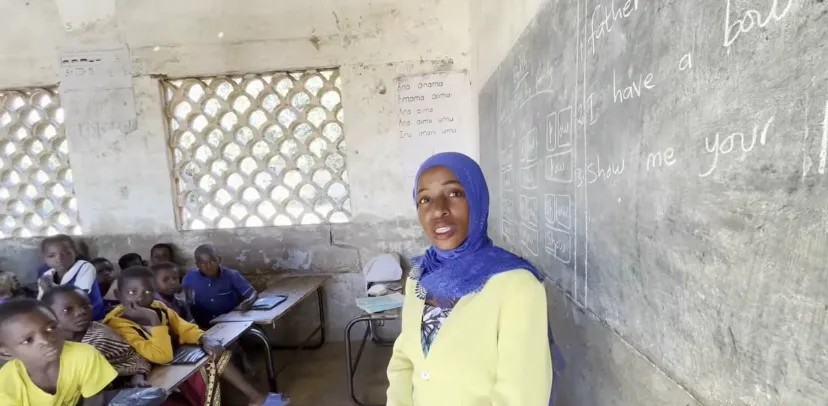
The Plot Twist: When Bureaucracy Meets Humanity
Every story needs conflict. Namadingo’s began in Mangochi, where he’d planned to repair ambulances. But that script got rewritten by bureaucracy—procedures, protocols, proposals, and reviews. The machinery of systems was grinding while vehicles meant to save lives sat idle.
The turning point came with a letter from Wakata Primary School asking for help. No red tape. No committees. Just children needing classrooms.
“After careful consideration, I have decided to move the money,” he announced, improvising a new ending to his Mangochi story.
The Set Design: Minimalism as Message
Great theater often finds power in simplicity. Namadingo’s Wakata set speaks volumes through absence:
- A laptop on a simple table (his recording studio reduced to its essence)
- Portable speakers (ready to create music in spaces that have known only sighs)
- A folding chair (luxury in a village context)
- That mattress on the floor (the most eloquent prop of all)
“Today is the first day of my stay in my house in Wataka Village,” he announced. “I’ll be calling this place home until I complete building a school block.”
Home. Not lodging. Not accommodation. Home.

The Audience: 1,914 Critics Who Matter Most
In show business, critics can make or break careers. Namadingo’s harshest critics wear torn uniforms and carry dreams heavier than their worn schoolbags. They don’t review his performance in newspapers—they live its consequences.
“98% of these learners are Muslims,” he notes, the Christian artist finding his most important audience in children whose prayers differ from his own. But in this theater, faith becomes merely a backdrop to the main drama: education versus decay, hope versus resignation.
The photos capture moments no staging could improve: Namadingo surrounded by women in vibrant hijabs, standing with local religious leaders, embracing children whose smiles outshine any spotlight.
The Soundtrack: Silence and Sand
For an artist whose voice has filled stadiums, Wakata offers a different soundtrack:
- The scrape of bricks being stacked
- The whisper of sand being sifted
- The nervous laughter of students joking about dangerous walls
- The sighs of teachers managing impossible numbers
- The crunch of footsteps walking to that signal tree
“My days here start with fetching bricks and sand,” he documents. The rhythm of construction replacing the rhythm of concerts.
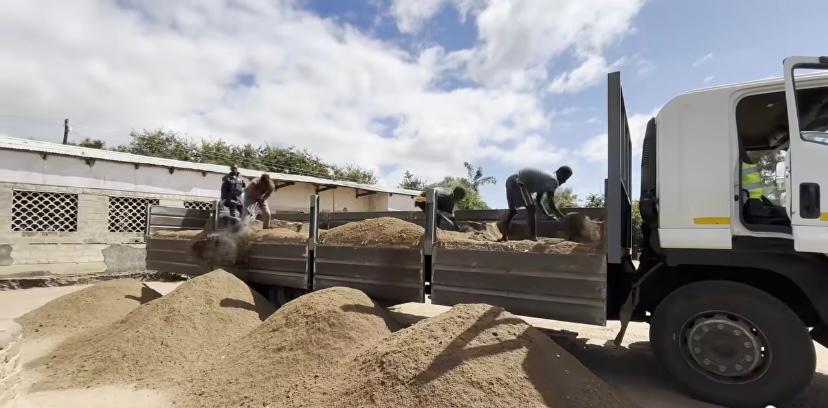
The Budget: Transparent as Truth
Unlike most productions, this one posts its budget publicly: MK 106,059,336.25 for a 33×8 meter school block with three classrooms. But the real costs aren’t measured in currency:
- 14 nights on a village floor
- Countless walks to find phone signal
- Professional engagements postponed
- Comfort surrendered for conviction
“I’ll be extremely grateful for any support anyone can possibly provide during this time of hard work,” he writes, the superstar becoming a supplicant for children’s futures.
The Intermission: When Stars Touch Earth
At intermission in traditional theater, audiences discuss what they’ve witnessed. But this performance has no intermission—only that nightly walk to the signal tree, where Namadingo posts updates before returning to village darkness.
“If you want to meet me in person, you know where to find me. I’ll be right here in Wataka Village.”
It’s not a stage door where fans wait for autographs. It’s an invitation to witness authenticity in action, to see what happens when celebrity serves community.
The Reviews: Written in Rising Walls
Critics won’t review this performance in entertainment sections. The only reviews that matter will be written in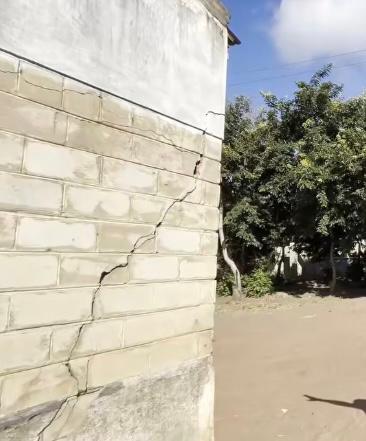 concrete and brick, measured in children who no longer fear wind, and counted in tears of relief from teachers who’ve carried impossible burdens alone.
concrete and brick, measured in children who no longer fear wind, and counted in tears of relief from teachers who’ve carried impossible burdens alone.
“By the time I leave this village, they will have the school block they have been looking for,” Namadingo promised. Not “they might have” or “we hope to build.” The certainty of someone who’s staked his reputation not on album sales but on classroom walls.
The Encore: A Different Kind of Standing Ovation
In two weeks, when walls stand where trees once sheltered learners, there won’t be roses thrown on stage. No encore calls. No curtain calls. Just 1,914 children entering classrooms without checking the sky for rain or wind.
The Muslim teacher will still manage too many students. The challenges won’t vanish overnight. But fear—that constant understated performer in this drama—will finally exit stage left.
The Final Act: When Performance Becomes Purpose
As night falls in Wakata and Namadingo makes his now-familiar journey to the signal tree, his transformation completes itself. The White Shirt Village Boy isn’t a character anymore—it’s who he’s become, if only for these precious days.
His greatest hit won’t be streamed on Spotify. It will echo in classrooms where children learn without fear, in communities that witnessed a star choose dust over spotlights, and in the proof that sometimes the most powerful performance happens offstage.
“One step at a time,” he posted earlier, not knowing he was writing his artistic manifesto.
In Wakata, under stars that outshine any stage lights, Dr. Namadingo has found his Carnegie Hall. It looks nothing like he imagined. It sounds nothing like his albums. But it might just be the performance that defines not just his career but his humanity.
The show must go on. And in Wakata Village, it does—brick by brick, day by day, child by child.
The curtain rises each dawn. No tickets required. Just the courage to witness what happens when fame finds purpose, when stages become service, when the greatest songs are sung in silence.
Dr. Namadingo remains in Wakata Village. His performance continues.

